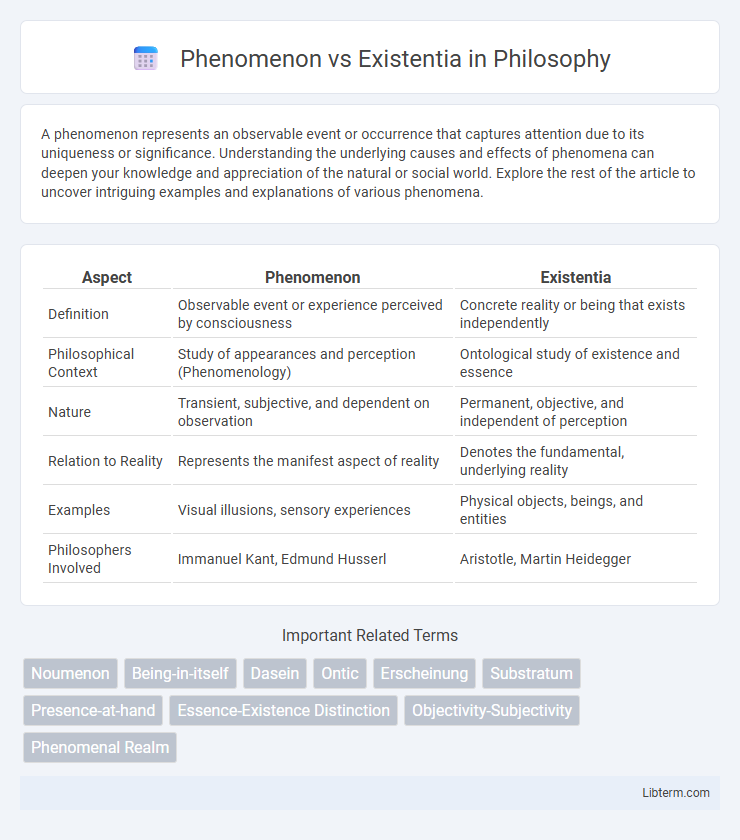A phenomenon represents an observable event or occurrence that captures attention due to its uniqueness or significance. Understanding the underlying causes and effects of phenomena can deepen your knowledge and appreciation of the natural or social world. Explore the rest of the article to uncover intriguing examples and explanations of various phenomena.
Table of Comparison
| Aspect | Phenomenon | Existentia |
|---|---|---|
| Definition | Observable event or experience perceived by consciousness | Concrete reality or being that exists independently |
| Philosophical Context | Study of appearances and perception (Phenomenology) | Ontological study of existence and essence |
| Nature | Transient, subjective, and dependent on observation | Permanent, objective, and independent of perception |
| Relation to Reality | Represents the manifest aspect of reality | Denotes the fundamental, underlying reality |
| Examples | Visual illusions, sensory experiences | Physical objects, beings, and entities |
| Philosophers Involved | Immanuel Kant, Edmund Husserl | Aristotle, Martin Heidegger |
Understanding Phenomenon: Definition and Scope
Understanding phenomenon involves recognizing it as an observable event or occurrence perceived through human senses or instruments, encompassing all experiences that manifest in reality. The scope of phenomenon extends beyond mere appearances to include sensory data, events, and patterns that can be analyzed scientifically or philosophically. Distinguishing phenomenon from existentia highlights the difference between what is observed and the underlying reality or existence beyond perception.
Existentia: Exploring the Concept of Existence
Existentia delves into the essence of existence, emphasizing the concrete reality of being rather than mere perception or appearance. This concept highlights the tangible aspects of life that persist beyond subjective experience, grounding philosophical discussions in actual presence. Understanding Existentia requires analyzing the interplay between existence and consciousness, revealing the foundational nature of reality itself.
Historical Perspectives on Phenomenon and Existentia
Historical perspectives on Phenomenon and Existentia trace back to ancient philosophy, where Plato distinguished between the world of appearances (Phenomena) and the realm of true being (Existentia). Aristotle expanded this by exploring substance and essence, emphasizing the intrinsic reality underlying phenomena. Later, existentialist thinkers like Heidegger reexamined Existentia as authentic existence, contrasting it with mere observable phenomena, shifting focus from abstract metaphysics to lived human experience.
Phenomenon in Philosophical Discourse
Phenomenon in philosophical discourse refers to the observable, experiential reality as it appears to consciousness, emphasizing perception and sensory experience over underlying essence or being. Rooted in Kantian philosophy, phenomena contrast with noumena, which denote things-in-themselves beyond human cognition. This concept underpins phenomenology, where thinkers like Husserl explore the structures of consciousness and how phenomena reveal meaning and existence.
The Nature of Existentia in Metaphysics
The Nature of Existentia in metaphysics concerns the study of being and existence as fundamental realities underlying phenomena. Existentia refers to entities that possess independent, concrete reality, distinguishing them from mere phenomena, which are appearances or experiences contingent on perception. This inquiry explores how existentia grounds the structure of reality, emphasizing ontological status beyond subjective experience.
Key Differences Between Phenomenon and Existentia
Phenomenon refers to any observable event or occurrence perceived through the senses, emphasizing external appearance and experience. Existentia denotes actual existence or being, focusing on the intrinsic nature and reality independent of observation. The key difference lies in phenomenon as perceptual manifestation, while existentia signifies concrete existence beyond perception.
Phenomenological Approach to Reality
The phenomenological approach to reality emphasizes direct experience and consciousness as fundamental to understanding existence, contrasting with the traditional notion of Existentia, which centers on objective being. Phenomenon in this context refers to the way objects appear in our experience, highlighting intentionality and the subjective constitution of meaning. This approach, pioneered by philosophers like Edmund Husserl, seeks to uncover the structures of experience that reveal the essence of reality.
Existentia and Human Experience
Existentia centers on the tangible reality of human existence, emphasizing concrete experiences and the material aspects of life over abstract perception. This concept highlights how individuals engage with their authentic selves and the external world through direct interaction and awareness. Human experience within Existentia is grounded in presence, emphasizing lived moments and the physical condition of being.
Practical Implications in Modern Thought
Phenomenon and Existentia represent distinct dimensions in modern philosophical discourse with significant practical implications for understanding reality as experienced versus reality as it inherently is. Phenomenon pertains to the observable and interpretable aspects of existence shaped by human perception and cognition, influencing fields such as phenomenology, psychology, and cognitive science by emphasizing subjective experience in knowledge acquisition. Existentia, or existence itself, grounds ontological inquiries and affects ethical frameworks and existentialist thought by focusing on objective being beyond mere appearance, thus informing contemporary debates about authenticity, freedom, and identity.
Synthesizing Phenomenon and Existentia: Toward a Unified Understanding
Synthesizing Phenomenon and Existentia bridges the gap between observable events and underlying existence, offering a cohesive framework that integrates empirical data with metaphysical realities. This unified understanding enhances interpretations in philosophy and science by aligning experiential phenomena with ontological structures, fostering comprehensive analyses of reality. By merging these concepts, scholars can better address the dynamic interplay between appearance and being, refining theories of knowledge and existence.
Phenomenon Infographic

 libterm.com
libterm.com